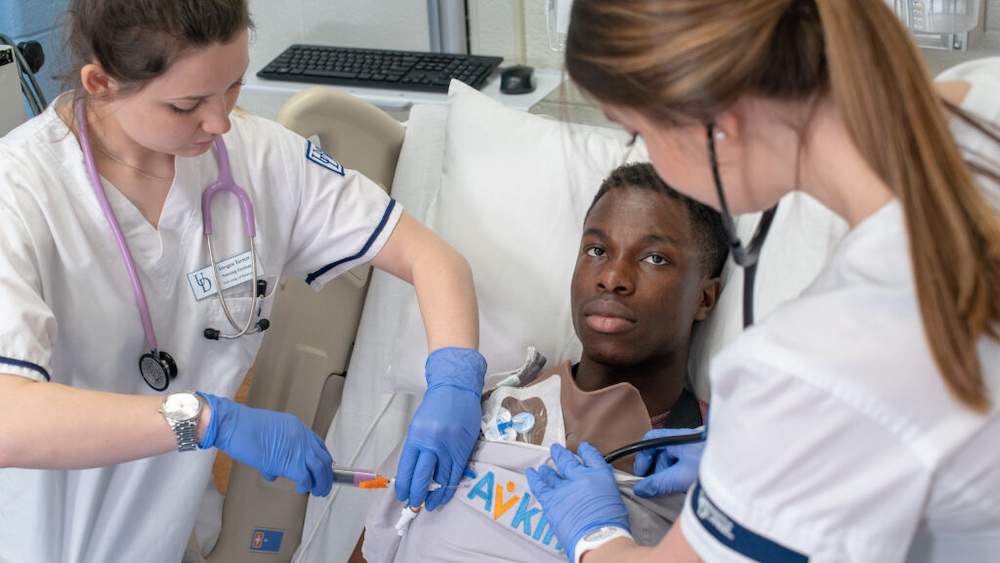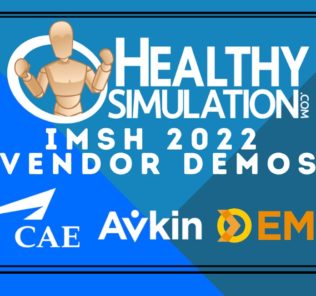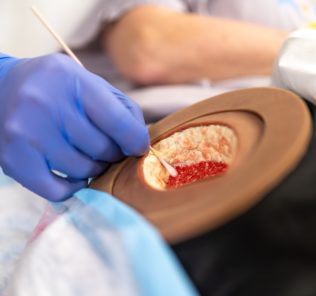NCLEX Changes Require Human Component During Clinical Simulation
For some time now, hospital administrators and staff have found that many novice nurses lack the skills necessary for treating patients. To address this gap, the National Council of State Boards of Nursing (NCSBN) has developed the Clinical Judgement Measurement Model, part of the Next Generation NCLEX (NGN). This model was designed based on nursing literature, pedagogy, psychology, decision science and investigated data from more than 200,000 NCLEX candidates. Proving the need for such advances in healthcare education, according to a 2011 study in the Journal of Nursing, only 20% of employers were satisfied with the decision-making abilities of new nurses. Even among experienced nurses, a 2004 study in Quality and Safety in Health Care found that up to 65% of adverse patient events are not only preventable but are the result of poor clinical decision-making.
As a result of these statistical findings, the NGN will be used to evaluate nursing learners beginning in 2023. This new test will ask learners complex questions, requiring them to demonstrate clinical judgment skills in real-world scenarios. Picking up on visual cues, body language and expressing empathy will be vital skills to pass this new exam.
Incorporating live humans in simulation is already common practice in many leading educational institutions. These programs incorporate actors (known as SPs) with wearable devices and detailed archetypes to play. Not only are the learners practicing technical skills such as catheterization, but they also practice human interaction at the same time, as they would in reality, an essential skill to develop in next-generation nurses.
Sponsored Content:
The SPs authentically pace their backstory, so novice nurses will learn to recognize subtle, but important cues. These cues can hint at home issues or underlying health concerns. Learners practice conversational skills in a safe environment. Should they falter in clinical simulation, no one is harmed. Instead, the learner receives feedback from their instructors and other professionals. The SP gives constructive feedback from the patient’s point of view; building the crucial judgment skills tested in the NGN. Most importantly, however, is that the nurse can ask questions of the SP that would be inappropriate in a clinical environment.
Helping provide training on such environments, Avkin develops realistic wearable simulators and healthcare to help improve nursing learners’ preparedness, while meeting NCSBN standards. These wearable simulators and simulations have long been recognized by educators and healthcare administrators for replicating life-like experiences among learners. Realistic skin allows students to use the same products they would in real life. Haptic feedback technology cues the SP to react realistically. Educators can maintain control using the Avkin app to control the amount of exudate or to communicate when the time for the next clinical simulation phase with the SP is.
“Avkin is dedicated to providing as much realism as possible,” said Co-Founder and CEO Amy Cowperthwait. “The wearable simulators and sophisticated patient presentations in our simulation curriculum take next-gen nursing education to the next level where they can practice both communication and technical skills in a safe, true-to-life environment.”
From tracheostomy to IV access, to pressure ulcer care, Avkin’s Manikin Replacement Package allows learners to practice a multitude of skills, seamlessly replicating the clinical environment in simulation. Not only do the devices look real, but each product is also designed to allow the SP to react in real-time. For instance, the Avtrach has sensors at the carina and faceplate; the Avwound has pressure sensors, cueing the SP to demonstrate pain or discomfort.
Sponsored Content:
“The Manikin Replacement Package is a testament of our drive and commitment to create realistic but safe learning environments for up-and-coming healthcare professionals to master critical skills before ever seeing their first patient,” said Cowperthwait. “If we as educators fail the largest healthcare profession workforce, we not only fail the new graduates, we fail the patients they will serve and the healthcare system at large is in jeopardy of losing an entire generation of nurses because of burnout and disillusionment.”
More About Avkin
Avkin exists to impart healthcare learners the chance to stretch themselves to the edge of their abilities and to learn from both their successes and failures. The company seeks to understand gaps in the learning experience, strives to adapt to the changing demands of healthcare delivery, and focuses on the knowledge, skills and attitudes required of any healthcare profession. These are accomplished with a multipronged approach based on the four tenets of Avkin; Build, Train, Create and Wear.
Consultation from Avkin’s education team has helped schools build their own sustainable, budget-friendly SP program. Avkin also trains SPs and simulation faculty in best practice standards, incorporating SP feedback in debriefing, ensuring learning objectives are met and confidence is built. Either with the Simulation Subscription Library or custom-designed virtual telehealth simulations, Avkin has a complete package, ready to use. Finally, Avkin produces lifelike wearable devices based on human physiology, which allow learners to fully immerse themselves in the learning experiences.
“[The future of nursing simulation is] a mix of AR and simulated participants for training. There is no denying that VR/AR technology is just getting better. The key to better preparing learners for the clinic is acknowledging that they will still not replace the human connection. I think the future of simulation is using VR and AR technology as an interactive way to gain confidence with repetitive tasks while using simulated participants to learn the human element that can so easily be overlooked by cool tech,” explained Amy Bucha, chief scientific officer at Avkin.
Avkin has consistently been recognized for innovation in the healthcare simulation field. Its prototype of the Avtrach, a tracheostomy simulator, won the First Place Technology and Innovation Award from the Society for Simulation in Healthcare, leading to Avkin’s founding. It’s been recognized as a Best University Startup by the National Council of Entrepreneurial Tech Transfer, and even won a Golden Stethoscope award from a Shark Tank Edition of the Dr. Oz show. Avkin’s CEO Amy Cowperthwait won the inaugural Hayden Vanguard Award from the International Nursing Association for Clinical Simulation and Learning for moving the field of simulation education forward in a meaningful way.
Learn More About Avkin Wearable Simulators
Today’s article was guest authored by Garret Walton, Solutions Development Representative at Avkin.
Have a story to share with the global healthcare simulation community? Submit your simulation news and resources here!
Lance Baily, BA, EMT-B, is the Founder / CEO of HealthySimulation.com, which he started in 2010 while serving as the Director of the Nevada System of Higher Education’s Clinical Simulation Center of Las Vegas. Lance also founded SimGHOSTS.org, the world’s only non-profit organization dedicated to supporting professionals operating healthcare simulation technologies. His co-edited Book: “Comprehensive Healthcare Simulation: Operations, Technology, and Innovative Practice” is cited as a key source for professional certification in the industry. Lance’s background also includes serving as a Simulation Technology Specialist for the LA Community College District, EMS fire fighting, Hollywood movie production, rescue diving, and global travel. He and his wife live with their two brilliant daughters and one crazy dachshund in Las Vegas, Nevada.
Sponsored Content:

















